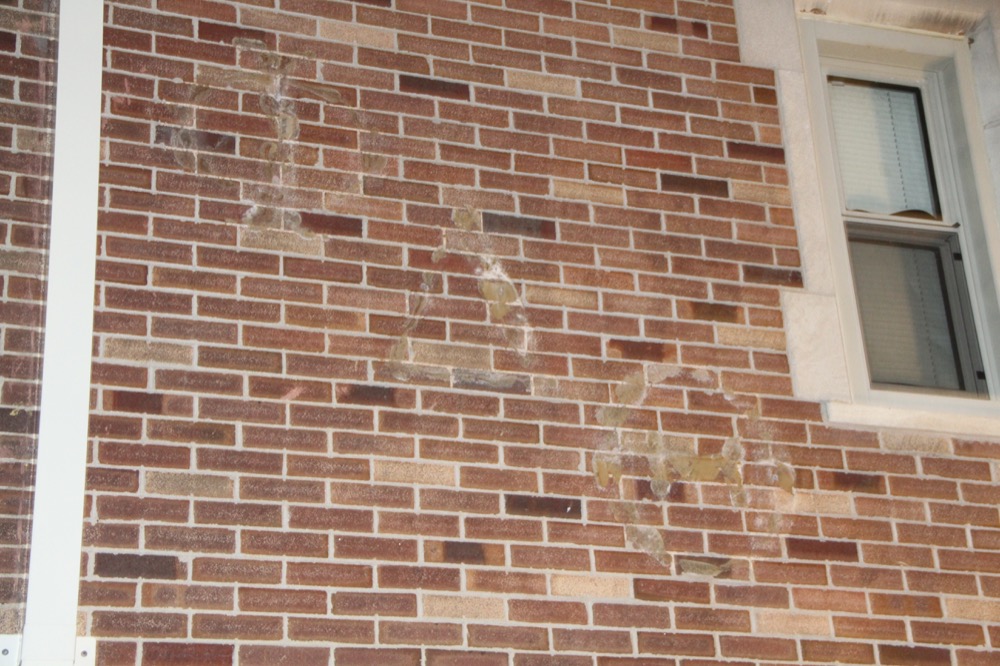Greek Life | News
WPA, black students petition for former Phi Delta Theta house
After the permanent suspension of Phi Delta Theta, Washington University is currently in the process of re-assigning fraternity House 5 to one of two groups on campus—black students or the Women’s Panhellenic Association—for the 2018-2019 school year.
In response to junior Matthew Wallace’s article in Student Life arguing for administration to turn fraternity housing over to minorities and women, Vice Chancellor for Student Affairs Lori White and Associate Vice Chancellor for Student Affairs Rob Wild reached out to him directly, along with senior Reuben Hogan, president of the Association of Black Students (ABS) to discuss the possibility of creating a Residential Life option for black students.
 Aaron Brezel | Student Life
Aaron Brezel | Student Life The Greek letters on the side of the former Phi Delta Theta house have been removed. The house will either go to the Women’s Panhellenic Association or to black students on campus.
Women’s Panhellenic Association (WPA) also submitted a proposal for House 5. Both groups were expected to put together a petition to confirm they would have the 30 students needed to fill the house.
According to Hogan, developing housing space within Residential Life for minority students is not a new idea. Two years ago, senior Kielah Harbert took the initial step to speak with Wild about housing options for black students. Since then, Harbert and junior Ahmani Simpson began the Black House Movement, hoping to cultivate interest and support for black residential housing.
“This is not something that is wildly new,” Hogan said. “A number of other campuses have residential spaces for black students. This is the first time that Wash. U. is getting on board.”
In fact, many of Washington University’s peer institutions already have minority housing in place, including Northwestern University, the University of Chicago, Tufts University, Georgetown University and Cornell University.
Hogan expressed his hope to create a safe space for all minorities on campus.
“It’s not so much what ABS wants to explicitly do with it but what the larger black community wants to do with it,” Hogan said. “Fraternities on campus especially are typically spaces of oppressions, usually spaces of illicit activities or a number of others like toxic masculinity and other really damaging forces. And [this] offers the opportunity for the black community to—sort of in the midst of all that—cultivate that spirit of cultural identification and to really kind of band together as a creative space in the midst of all this really toxic masculinity and forces that we are very familiar within this world to really create a space that is inclusive of everybody in a culturally sensitive way.”
The house, in its current setup, has 30 beds, configured as 9 singles, 9 doubles and one triple. If black students secure the house, they will need to appoint two resident advisers and have 28 students live in the house.
If the Women’s Panhellenic Association acquires the house, it plans to convert the chapter room into a suite for Gamma Phi Beta, which currently does not have a suite in the Women’s Building. WPA would also implement programming, including mixers with sororities and other student groups, open dinners and annual events like big/little crafting.
According to WPA president and junior Genevieve Leach, developing a space for sorority women isn’t a new idea, either.
“It’s been something that we’ve been talking about since the beginning of this semester. Not with Phi Delt house in particular but as a general idea of having…a multi-sorority house,” Leach said, “The power dynamics of always being in fraternity basements for mixers and in male in-spaces [is hard]… Having our own space for mixers, both with and without fraternities, [would make it] so that it’s easier to mix with sororities or other student groups, especially with the increase in LGBT members of sororities.”
Leach also highlighted benefits associated with a large group of women living as one community.
“Our final part [of the proposal] was about the organic connections that occur when you have sorority women living together and connecting, rather than just having formal and short-term programming,” Leach said.
According to Wallace, this is not a competition for House 5 but rather a way to start a conversation with the administration, expressing the need for both minority housing and sorority housing.
“Talking to some girls in sororities, it seems like Wash. U. is going about this the wrong way,” Wallace said. “It seems like they’re putting these two groups in competition to where really, we both want each other to have space. There’s no reason to compete. You can find space for both groups, just if you want it.”
Leach agrees, believing that regardless of who gets House 5, it will be a step in the right direction.
“I am hopeful that we get the house, but I also think that the African-American students deserve this space as much as we do,” Leach said. “And I think—either way that it goes—it’s a good start to a larger conversation with ResLife.”
